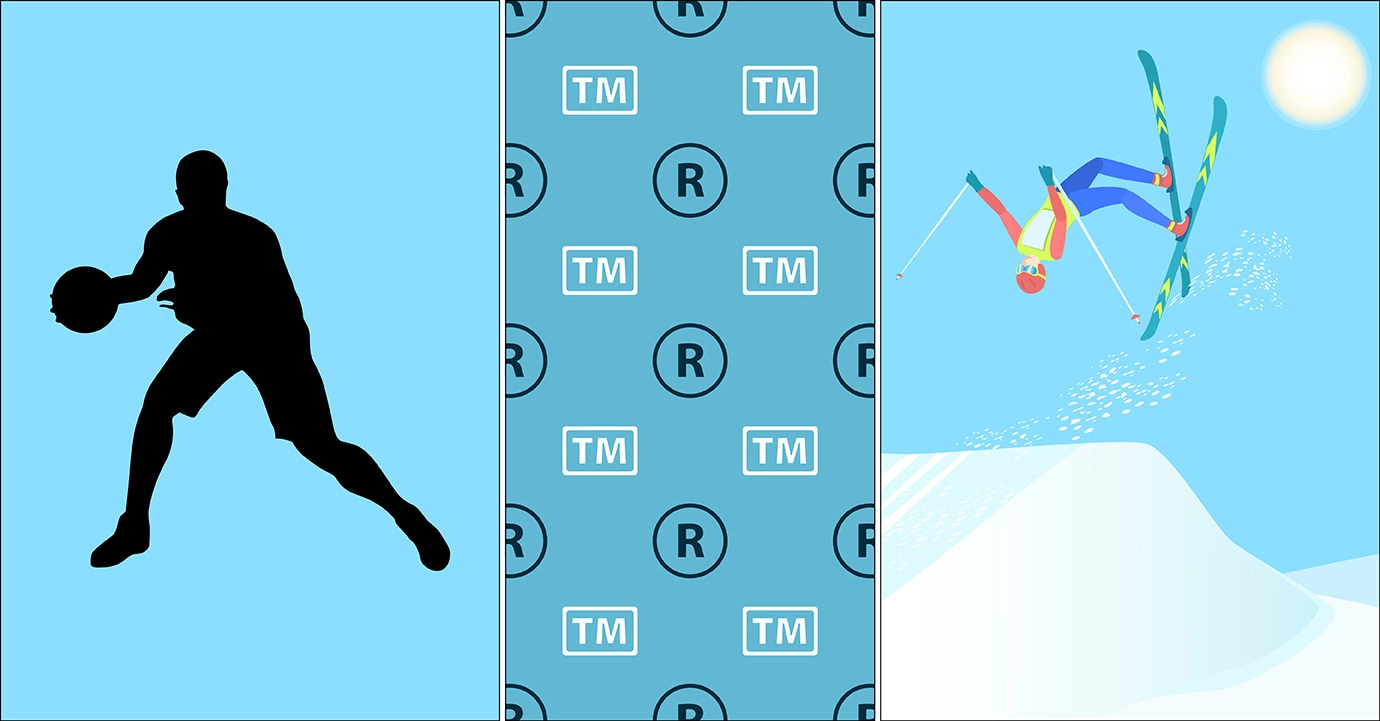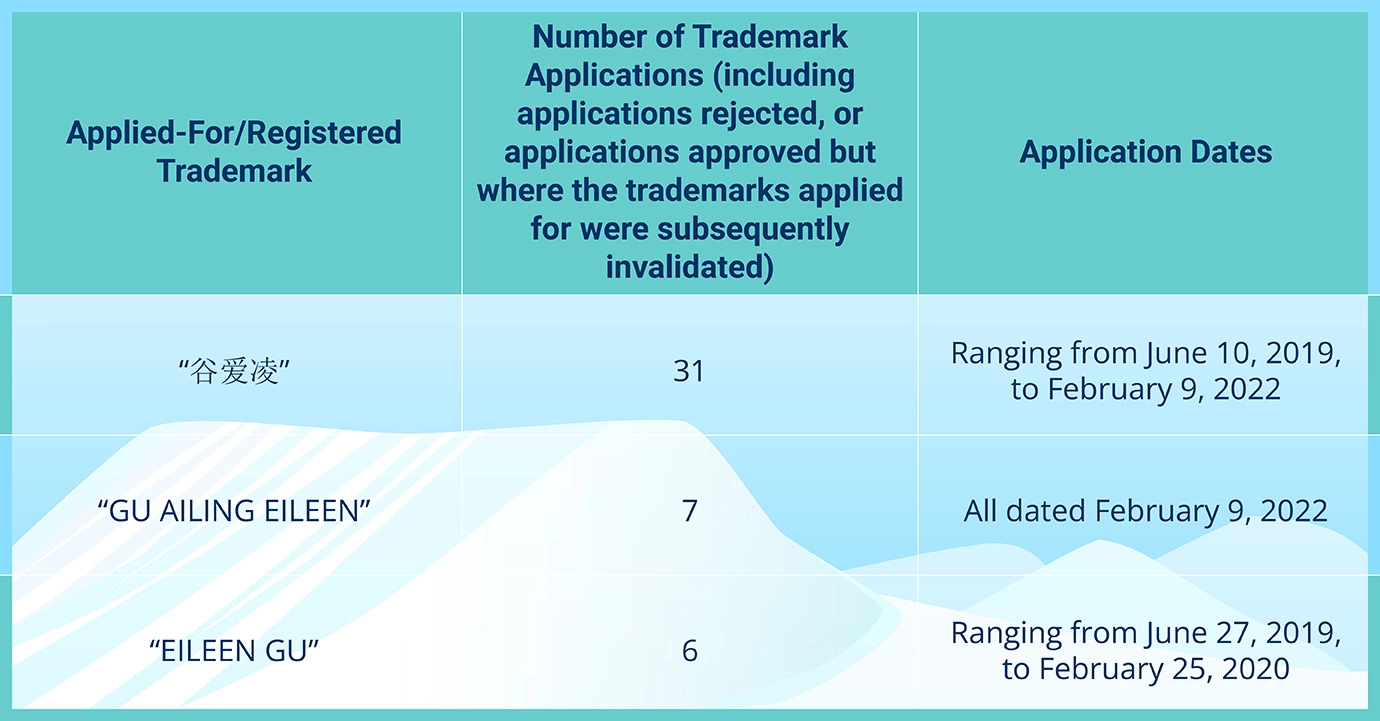From Michael Jordan to Eileen Gu:
Lessons for Celebrities Seeking to Protect Their Names in China &
A (Possible) Forewarning for Alibaba†
Table of Contents
Estimated Reading Time
- 6 min

Sazhnieva Oksana;
Artreef (Shutterstock.com)
In a notice released on February 14, 2022, the China National Intellectual Property Administration (“CNIPA”) noted the malicious registration of Olympic mascots and athletes’ names as trademarks. As a result, CNIPA invalidated 43 registered trademarks (including 1 registered as “EILEEN GU” and 11 as “谷爱凌” (pronounced as gu ailing; this is the Chinese name of Eileen Gu, a U.S.-born Olympic freestyle skier whose popularity has skyrocketed in China since she won a gold medal for the Chinese team)) and rejected 429 trademark applications (including 23 seeking to register “EILEEN GU” or “谷爱凌” as trademarks).
A few quick searches conducted by the SINOTALKS.COM team on China’s official trademark database reveal that the malicious registration of the names of well-known or rising athletic stars is indeed serious. For example, as of February 13, 2022, a search for “谷爱凌” on the database showed that from June 10, 2019, to February 9, 2022, 31 applications were filed by different individuals or enterprises to register “谷爱凌” as a trademark. Many of these applications were rejected while some led to registrations of trademarks. Some of the registered trademarks were subsequently invalidated but quite a few remain valid. The following table shows the results of this search and two other searches:

Apart from the above three names, many other homonyms or related variations have been used in other trademark applications to evoke an association with skier Eileen Gu.
Given all these developments, what lessons can be learned by celebrities seeking to protect their names in China? In addition, in the CNIPA’s February 14 announcement, four of the rejected trademark applications and four of the invalidated trademarks are identified as having been handled by “阿里巴巴科技(北京)有限公司” (i.e., Alibaba Technology (Beijing) Co., Ltd.). I am going to explain why this may be a forewarning for this company after discussing the lessons for celebrities.
Lessons from Michael Jordan’s Trademark Cases in China
The malicious registration of trademarks, as discussed above, bears similarities to legendary basketball player Michael Jordan’s trademark cases in China. One of these cases was reissued as Guiding Case No. 113 (Michael Jeffrey Jordan v. The Trademark Review and Adjudication Board of the State Administration for Industry and Commerce and Qiaodan Sports Co., Ltd., An Administrative Case Concerning a Dispute over the “乔丹” Trademark). The Guiding Case has established clear principles with de facto binding effect (for details about such effect, see SINOTALKS.COM In Brief No. 2) to allow a foreign natural person to seek protection of not only his or her name, but also any specific name (e.g., the Chinese translation of the person’s foreign name) used by “the relevant public” in China to refer to the person so long as three conditions are met:
(1) the specific name is, to a certain degree, well-known in China and is known to the relevant public; (2) the relevant public uses the specific name to refer to the natural person; and (3) a stable correspondence relationship has already been established between the specific name and the natural person.
Because “乔丹” (pronounced as qiao dan), the specific name that has been commonly used in China to refer to Michael Jordan, meets these three conditions, the court decided that Michael Jordan has the “right to name” with respect to “乔丹”, even though he does not use “乔丹” to refer to himself. However, Michael Jordan does not have the “right to name” with respect to “Qiao Dan” (i.e., the transliterated version of the Chinese name as rendered in English letters) because this name—which the relevant public in China does not use to refer to Michael Jordan—does not satisfy the above three conditions. For more discussion of these cases, see Yi Chen & Xinyue Zhu, The Series of “乔丹” Trademark Cases: The Impact on the Infringing Company and the Implications for Celebrities, 10 China Law Connect 13 (Sept. 2020).
With the above discussion in mind, celebrities seeking to protect their names in China must not forget about other names the relevant public in the country might use to refer to them, including popular but unofficial or informal transliterations of their names in Chinese. As a result, taking preemptive measures (e.g., registration) to protect these other names is wise, as it may not be easy to adduce sufficient evidence to prove that the three conditions mentioned above are met.
A Forewarning for Alibaba?
Alibaba Technology (Beijing) Co., Ltd.’s handling of trademark applications has aroused concerns for some time. The company uses an automated trademark application platform to allow applicants to conveniently go through the application process online. Unfortunately, the platform seems to lack a rigorous review process to ensure the quality of applications. In fact, in March 2020, the Market Supervision Administration of Chaoyang District, Beijing Municipality, imposed a fine of RMB100,000 on the company for handling coronavirus-related trademark applications. Among these applications were several attempting to register the name of the late Dr. LI Wenliang, a Wuhan physician who cautioned his colleagues about the new coronavirus. Dr. Li has been considered a hero in China.
Now, Alibaba Technology (Beijing) Co., Ltd. has also been found to have handled a few trademark applications identified as problematic in the CNIPA’s February 14 announcement. Will this prompt the company to take remedial measures as soon as possible? After all, with all the regulatory challenges facing Alibaba, the company does not need another challenge that will result in further scrutiny from authorities.
† The citation of this article is: Dr. Mei Gechlik, From Michael Jordan to Eileen Gu: Lessons for Celebrities Seeking to Protect Their Names in China & A (Possible) Forewarning for Alibaba, SINOTALKS.COM, In Brief No. 6, Feb. 23, 2022, https://sinotalks.com/inbrief/michael-jordan-trademark-china.
The original, English version of this article was edited by Nathan Harpainter. The information and views set out in this article are the responsibility of the author and do not necessarily reflect the work or views of SINOTALKS.COM.



